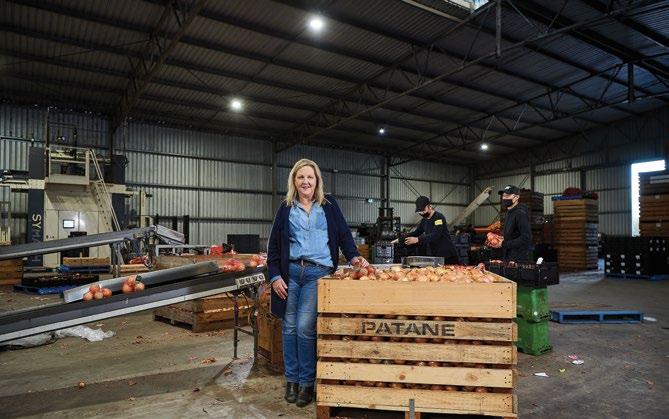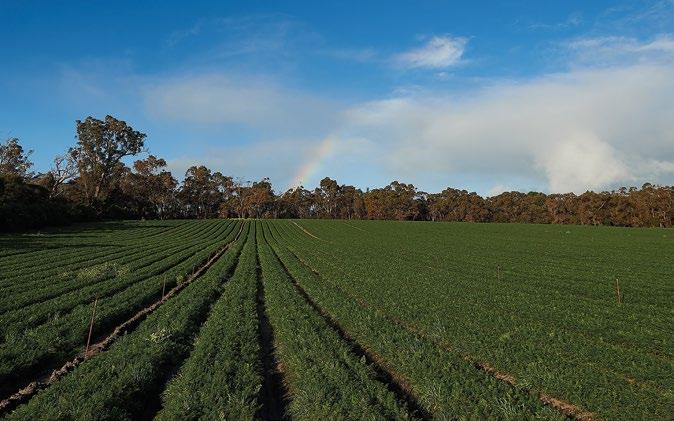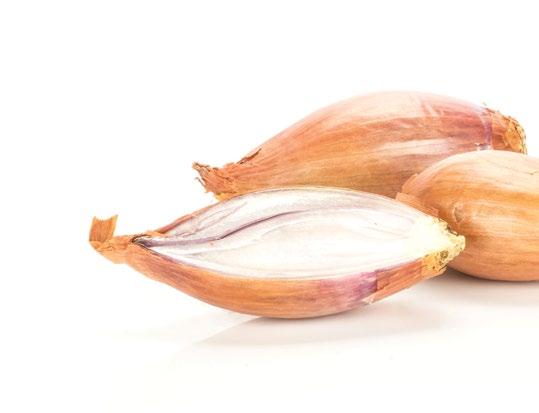
5 minute read
Patane Produce
Get to know your potato growers…
3 (L–R) Michael, Lauren, Pennie, Jess and Sam Patane.
Advertisement
Patane Produce
Formed in 1999 in Myalup on 675 hectares, Patane Produce is a stand-out operation in Western Australia.
The vertically-integrated business employs around 65 staff over the course of each year and includes comprehensive packing facilities for all lines grown. The temperate climate of the region allows for produce lines to be supplied for 12 months of the year.
PERTH MYALUP
Farmer Location Size Enterprises
Michael and Pennie Patane Myalup 675 hectares Potatoes, carrots, onions, broccoli, purple carrots, shallots & eschalions
Patane Produce founders Michael and Pennie make a formidable team. Michael Patane is a third-generation potato farmer, having taken the learnings from his parents and grandparents and venturing out to setup his own business. Pennie comes to the enterprise from a banking background, bringing astute business acumen to the farm.
Pennie and Michael’s children are ensuring a fourth generation of Patane’s will continue with potato farming. The eldest, Lauren, aged 22 is working fulltime on the farm after completing a degree in Agricultural Science. Jesse, aged 21 is currently at university studying psychology and human resources, and works part-time on the farm, while the youngest, Sam aged 19, works full-time on the farm.
Pennie is also an active industry member and currently serves on the following committees: · Potato Strategic Investment Advisory
Panel (national) · Board member of AUSVEG (national) · Member of the Agricultural Advisory
Committee for Harvey Agricultural
College Q: What makes your business different from others in WA? We started the business from scratch with a view to create a vertically integrated operation. The business model means we can grow, pack, transport, sell direct to retailers, to the domestic market from our own market floor, and also sell direct to export markets. In addition to potatoes, we grow a variety of crops including carrots, onions, broccoli, purple carrots, shallots and eschalions.
Q: What are the key benefits of vertical integration? Vertical integration has benefits both up and down the line. We can control all stages of the supply chain to ensure product integrity is maintained. There is less double handling and the cool chain is maintained. We have invested in the product so we handle it correctly and have quicker processing times. Plus, we get direct feedback on any issues or market changes or client requirements.
Q: Have you always farmed potatoes? What other crops/animals do you grow? We started with potatoes and then went to carrots, onions, broccoli. We also run around 300 head of cattle to utilise vegetable waste. Q: Have you had to make many changes due to COVID-19? A lot of the necessary procedures were already in place such as hand washing stations and glove washing. We run teams of staff in the packing sheds, rotate meal breaks, and implemented an extra cleaning regime between meal breaks. As always though it is business as usual in order to make sure the job gets done and the food gets delivered. Q: What sustainability measures do you have in place that people might not be aware of? Our farm is part of the EnviroVeg program which is an industry-led environmental best-practice management program for vegetable production businesses.


3 THE farm is part of the EnviroVeg program which is an industry-led environmental bestpractice management program for vegetable production businesses. The program provides tools for vegetable businesses to be responsible stewards of land, water and biodiversity. We also have 300 head of cattle to utilise vegetable wastage. Q: What are some misconceptions about farming that you want to address? There are a few!
The first one is that we spend all day picking in the field or driving a tractor. Field work makes up around 10 per cent of our business. Our industry is highly mechanised and highly regulated and as such, we have nine accreditation programs that we work under and are audited to. There are lots of opportunities in this industry including Quality Assurance and auditing. We also wish more people realised that imperfect-looking produce is still perfect to eat! It’s depressing the amount of produce that we have to feed to the cattle because consumers and retailers don’t like the ugly stuff.
3 PENNIE comes to the enterprise from a banking background, bringing astute business acumen to the farm. Another one is that vegetables are expensive. Labour makes up 50 per cent of the production costs of fresh produce, which impact the price. It would be great if people could keep that in mind when comparing the price of fresh produce to a chocolate bar on a per gram basis. Lastly, we want people to know why we choose to use foreign/backpacker labour. In actual fact, it’s not a choice, as locals would not do the work. We are investing heavily in mechanisation so that we can offer more skilled positions to locals in the future. We also offer traineeships for local gap year students and are working to develop apprenticeships that are tailored to our industry. Q: What does the future hold for Patane Produce? We are aiming to expand into direct export markets to grow the business. We still have farms to developed and packing lines to be updated, there is always something new in this space. We are also trying to develop and change our workforce to reduce our reliance on non-resident employees and offer more interesting positions for our local workforce.
Q: Which is your favourite potato variety? This depends which member of the family you ask but the red potato varieties such as Rodeo are the best allrounders — can use them for anything! Q: What is your favourite potato recipe? You can’t go past a good potato au gratin. We also love using the potatoes that are too small to sell — we par boil then pan fry them with olive oil and herbs.











